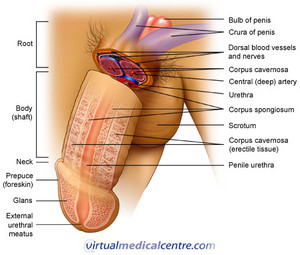Obesity, Sexual Health and Other Health Effects
 Obesity has been getting the attention of many health specialists because of the ill-effects it brings. Obesity is defined as an abnormal accumulation of body fat. Individuals who are 20 to 40 percent over one’s ideal weight is considered as mildly obese, 40 to 100 percent over the their ideal weight is considered moderately obese, and 100 percent over one’s ideal weight is considered severely obese. Body mass index, calipers, waist-hip ratio are some of the methods that are commonly used to measure body fat. Obese individuals might be prone to health risks like cardiovascular diseases, high blood pressure, certain types of ulcers and diabetes, and coronary heart disease. Recent medical studies reveal that obesity may also lead to low testosterone levels and hamper the sexual health of many men. It is suggested that obesity is a significant predictor of low testosterone. These studies add that gaining ten percent in one’s appropriate Body Mass Index (BMI) may lead to decreased testosterone levels by about ten percent.
Obesity has been getting the attention of many health specialists because of the ill-effects it brings. Obesity is defined as an abnormal accumulation of body fat. Individuals who are 20 to 40 percent over one’s ideal weight is considered as mildly obese, 40 to 100 percent over the their ideal weight is considered moderately obese, and 100 percent over one’s ideal weight is considered severely obese. Body mass index, calipers, waist-hip ratio are some of the methods that are commonly used to measure body fat. Obese individuals might be prone to health risks like cardiovascular diseases, high blood pressure, certain types of ulcers and diabetes, and coronary heart disease. Recent medical studies reveal that obesity may also lead to low testosterone levels and hamper the sexual health of many men. It is suggested that obesity is a significant predictor of low testosterone. These studies add that gaining ten percent in one’s appropriate Body Mass Index (BMI) may lead to decreased testosterone levels by about ten percent.
Because of this, fat or over weight individuals may have up to 25 percent less total testosterone than their fit counterparts. In addition to this, obesity may lead to high blood pressure, a condition that usually brings no obvious symptoms. High blood pressure may cause the blood vessels to harden and damage the lining of the blood vessels. Because of this development, less blood which carries oxygen and nutrients flow to the penis. Decreased blood flow may cause difficulties in achieving and maintaining erections. High blood pressure may also interfere with ejaculation and reduce libido. Many medications used to treat high blood pressure may also bring similar adverse effects.Obesity may also heighten the risk of developing several health conditions that may include the following: arthritis and other orthopedic problems like lower back painhernias heartburn adult-onset asthma high cholesterol levels gallstones irregular monthly periods and absence of menstruation (amenorrhea) infertility and pregnancy complications shortness of breath sleep apnea and other sleeping disorders skin disorders that develop because of bacterial breakdown from sweat and other cellular material in thick folds of skinOne of the probable causes of obesity high calories in diets coupled with inactivity.
A study conducted by the Morbidity and Mortality Weekly Report in February, 2004 showed that Americans consumed more calories than they did 30 years ago. The study found out that from 1971 to 2004, American women increased their calorie consumption from 1542 calories per day to 1877. The men on the other hand, at the same time frame, increased their calorie intake from 2,450 to 2,618. With the rise of calorie intake also came the decline of physical activities. However, less than 1/3 of adults engage in the appropriate amounts of exercise. In addition, 40% of adults in the United States do not participate in any physical activity while 43% of adolescents spend more than 2 hours in front of the television. It is recommended that individuals should accumulate at least 30 minutes among adults and 60 minutes among children of moderate physical activity three times a week. More are recommended to prevent weight gain or to lose weight. Obese individuals who want to improve their sexual health and overall well-being should engage in regular exercise and healthy diets.
Exercise is good for different people of all ages, sex, and weight. It is necessary to maintain overall health and enhanced well-being. Individuals who decide to include a regular program of physical activity should consult doctors and other health professionals for advice. This is important because a lot of individuals tend to workout too much or workout improperly, which may do more harm than good. Understanding healthy lifestyles and eating regimens may enable individuals to lose essential amounts of weight.



